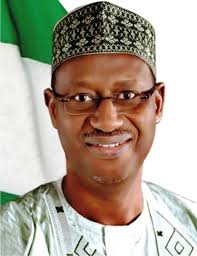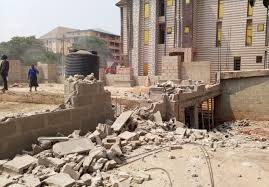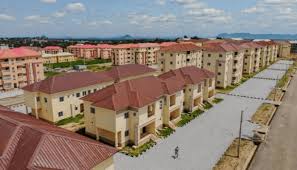
Lagos new rail transport system to trigger shift in land use pattern, hike in property prices
The new Lagos rail transportation system, especially the 13-kilometre rail line from Mile 2 to the Marina is expected to shift moderately land use pattern along the corridor.
Lead researchers for Lagos African Cities Research Consortium (ACRC) city systems study on transportation and energy, Yinka Jones and Lookman Oshodi, who revealed this to The Guardian said, it would significantly impact on urban planning by restructuring the urban space.
The corridor is lined with a mix of informal settlements, industrial development and mixed-use development, which are held majorly by the private sector. There are over five million personal motor vehicles (PMVs) and over 200,000 commercial vehicles on Lagos roads daily giving an average of 227 vehicles per kilometer of road. The early days of the BRT buses have shown that Lagosians are willing to drop their PMVs for efficient, convenient and safe public transportation modes.
The rail system will offer a relatively faster, more affordable, convenient and comfortable travel experience, transport option, compared to road modes of transportation. Thus, rail is very likely to easily attract patronage from commuters around the stations. The Lagos State government has estimated that the Blue Line would move 250,000 passengers daily when it finally commences operation.
They said: “All these developments will expand both vertically and horizontally, but the majority in an informal manner since there is no deliberately transit oriented development to re-arrange or respond to the potential of the new transport infrastructure.
“The development will expand in its traditional method of informality, especially when physical development institutions to manage the scenario development are not strong enough.”
The researchers, however, expect a hike in property prices along the rail line corridor, as it would cause an increase in commercial real estate activities in those areas, especially along the Marina to Okokomaiko route due to increased accessibility.
They further noted that it will improve quality of the environment by reducing carbon footprint of the transport sector and by implication, the health of residents, as well as quality of life of Lagosians.
It would also promote public transportation and discourage use of personal motor vehicles, stimulate economic growth, development (by boosting other sectors that are dependent on the transport sector, increase travel efficiency, thus, workers’ productivity) and job creation in adjoining communities.
On how urbanisation affects transportation system planning in the city, the experts said urbanisation makes transportation planning more complex, as urbanisation rate in Lagos fast outstrips the rate of development, which results in inadequate infrastructure with immense pressure on existing ones. “As the city grows and becomes more densely populated, the demand for efficient and reliable transportation options increases.
“The situation is even made worse in Lagos because of the growth pattern, which is largely unplanned, unstructured and informal as people continue to move to the suburbs and the fringes of the city in search of affordable housing.
“This, thus, creates the urgent need for expansion and upgrades of existing transportation infrastructure, such as roads, highways, public transit systems, and bike lanes to accommodate the growth. This inadequacy in infrastructure in Lagos contributes to increased traffic congestion, which can make it more difficult to move people and goods within the city.
“Additionally, urbanization can also lead to a reduction in air quality, which already is very poor and unhealthy, and water quality, as well as increased noise pollution with negative impacts on public health. As a result, transportation planners must take these factors into consideration when developing and implementing transportation plans in urban areas,” they said.
As the city’s population continues to grow, the town planners said it has become imperative that the relevant stakeholders, especially the government, should strengthen the opportunity to bring additional investments to implement the Lagos Strategic Transport Master Plan, which recognizes multiple modes of obtaining an efficient transportation system for the residents of Lagos.
According to them, the rising population is providing a clear justification that the current growth pattern of the city in the form of sprawl development cannot be sustainable, hence, a need for architectural transformation of the city to a more dense and compact approach, which can accommodate the emerging population.
Several inherent opportunities of improving transport and energy infrastructure in the state include:
• Improving transport infrastructure to ensure mobility and accessibility. This include building new roads, highways, public mass transportation systems, improving connectivity, investing in Non-Motorised Transport (NMT) modes, particularly for first and last mile transportation, and creating a well integrated transport system. This can help to improve mobility and accessibility for residents and businesses in Lagos. This can help to reduce traffic congestion, making it easier for people to access jobs, healthcare, and other essential urban services.
• Boosting economic growth and development: Investing in transport and energy infrastructure can help to attract new businesses and residents to Lagos, which can drive economic growth and development. This can create jobs and increase income opportunities for residents.
• Improving air quality and public health: Transitioning to clean energy sources, such as solar and wind power, can help to reduce greenhouse gas emissions and improve air quality in Lagos. This can have a positive impact on public health, as air pollution is linked to a range of health problems.
• Reducing dependence on fossil fuels: Improving energy infrastructure in Lagos can help to reduce dependence on fossil fuels. This can help to mitigate the impacts of climate change and reduce the country’s vulnerability to fluctuations in global oil prices.
• Creating job opportunities: Transitioning to clean energy infrastructure can create job opportunities in the clean energy sector, such as in the installation, maintenance, and operation of renewable energy systems.
• Reducing travel time: Improving transportation infrastructure can help to reduce travel time, which can help to increase productivity and improve quality of life.
The experts also believe that transportation and energy transition planning is crucial for creating a livable, sustainable, and economically competitive city in the Nigerian urban context, particularly in Lagos, where population growth and urbanisation have put a strain on the existing infrastructure.
They stressed that urban reform is needed to bring development to Lagos State’s transport and energy systems. “This is because urban reform would help improve infrastructure, promote sustainable transportation, address the issue of informal settlements and promote investment in cleaner energy sources such as gas and renewables.
Furthermore, it would improve energy efficiency by promoting the use of energy-efficient technologies, appliances and implementing energy-efficient codes/ regulations, and encouraging public-private partnerships in infrastructural development
Improving transportation infrastructure, promoting sustainable transportation, and investing in clean energy, are some of the key steps that can be taken to improve the livability, accessibility, and economic competitiveness of Lagos and other Nigerian cities.
They stated that implementation of existing policies and plans in the transportation and energy sectors should be considered a priority, while institutions to drive the implementation are also crucial.
“The ability to involve the local governments in the reform process will also be a key success factor, while the reform of transport sector gatekeepers popularly known as Agberos into a formal institution that remits revenue formally into the state’s treasury with conduct that projects Lagos as a modern economy will be a major boost for transportation in Lagos.
“With the opportunity for states to generate electricity in Nigeria and the new energy policy in Lagos State, it is expected that reform will be progressive if the implementations are effected accordingly. In the medium-term of the urban reform process around energy, an energy retrofitting approach should be adopted as this will be ideal for the energy transformation of many buildings and settlements in Lagos, the majority of which are in the form of informal and slum developments.
Also, they said transportation and energy transition planning are important for the growth and development of a city because they affect the overall quality of life and economic competitiveness of the city. Effective transportation systems, including public transit, biking, and walking (NMT modes generally) options, can improve access to jobs and urban services, reduce congestion, air pollution and the city’s transportation carbon footprint, and promote healthy and active lifestyles.
Energy transition planning, including the use of renewable energy sources and energy-efficient technologies, can reduce dependence on fossil fuels, lower greenhouse gas emissions, and save money on energy costs. Additionally, both transportation and energy planning can support economic development by attracting businesses and workers to the city.
Transportation and energy transition planning are critical for the growth and development of Lagos, and other cities in Nigeria, because they play a major role in shaping the city’s livability, accessibility, and economic competitiveness.
Jones and Oshodi agreed that the first phase of the Lagos blue line construction is an important milestone. However, they noted that the project is still a work in progress. This is because the initial idea and promise was to have a functional rail system that will help to contribute towards urban restructuring, decongest road traffic, and improve mobility and accessibility thereby reducing travel times, as well as creating job opportunities for Lagosians and improving city sustainability.
“The delays and changes to the project apparently have hindered the realisation of these promises and may have caused disappointment for Lagosians, particularly, those along the corridor who were looking forward to the full benefits of the rail system.
However, it is also important to note that the delay might have been due to factors such as land issues, funding constraints and technical difficulties.
According to LAMATA, it was hampered by issues of Right of Way recovery and relocation of services especially as a result of the change in the alignment. “The lack of transparency throughout the project suggests that there may be other reasons for the delay,” the experts said.
From conceptualization in 2001 to planning and execution, the rail project has spanned four administrations in Lagos State, each having its own idea on how the execution should proceed with implied non-state actor political interference and rising project cost.
In comparison, the 154 km Lagos-Ibadan rail project started in 2019 and was commissioned for passenger services in June 2021, a period of two years. After, about 20 years, the first phase of the 13 km Lagos Blue Line was commissioned recently by President Muhammadu Buhari.
Source: Guardian.ng
Similar Topics
The Lagos State Government, through the Lagos State Physical Planning Permit Authority (LASPPPA),...
6 days ago Read MoreThe Federal Government has expanded the Abuja-Kaduna-Kano Road project to incorporate a direct...
12 days ago Read MoreThe Federal Capital Territory Administration (FCTA) has taken possession of Wadata Plaza, the...
20 days ago Read MoreDefaulters on FCT ground rent now have 14 days grace to pay up what they owe the FCT Administration...
20 days ago Read MoreUnprofessional practices by estate agents in major cities are significantly influencing the spike...
a month ago Read MoreA Real estate development firm, Lifecard International Investment Company, has revealed that many...
a month ago Read MoreDespite a fall in investment volumes from the 2021 peak, there is an ongoing desire for property...
a month ago Read MoreThe Lagos State government has advised the leadership of the Nigerian Institution of Estate...
a month ago Read MoreReal estate market dynamics such as construction cost, land, finance, government policies and taxes...
a month ago Read MoreEvent Set to Celebrate Managers Who Shape Careers and Drive Organizational Growth Business...
2 months ago Read MoreGlobal Leaders to Converge in Lagos for Landmark Event Driving Urban Innovation and...
2 months ago Read MoreIn a bold move to redefine affordable luxury housing, Nigerian real estate giant Gtext Holdings has...
3 months ago Read MoreIndustry Experts Urge Anti-Corruption Measures, Innovative Financing to Address Crisis By: Oche...
3 months ago Read MoreLAGOS, NIGERIA – Global real estate consultancy Knight Frank and UK developer Mount Anvil...
3 months ago Read MoreBy Oche Onum Lagos, Nigeria As Nigeria’s real estate sector braces for 2025, rapid...
3 months ago Read MoreBy Oche Onum Abuja, Nigeria In a landmark move to combat climate vulnerabilities in urban...
3 months ago Read MoreLAGOS, NIGERIA The Federal Government announced plans Wednesday to establish a Real Estate...
3 months ago Read MoreAccording to The Guardian's investigation, 70% of Nigerian states rely on manual land...
3 months ago Read MoreWhat is the Initiative? The Federal Government of Nigeria has unveiled an N100 billion private...
4 months ago Read MoreAbuja, Nigeria’s gleaming administrative capital, has long symbolized hope for migrants...
4 months ago Read More














